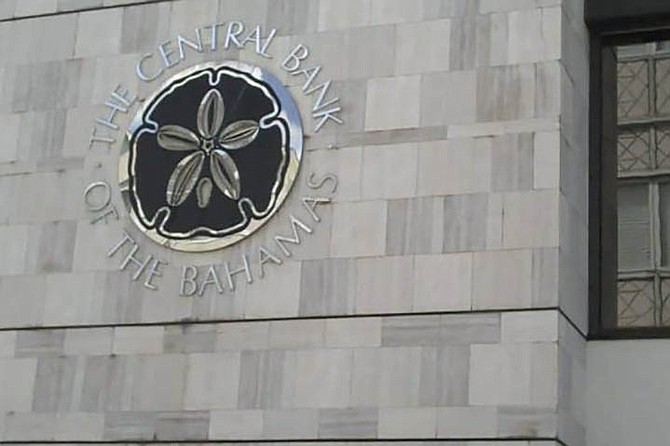By NEIL HARTNELL
Tribune Business Editor
nhartnell@tribunemedia.net
A Bahamian banker yesterday warned against premature panic after it emerged that borrowers sought repayment waivers for almost $2bn worth of loans at the COVID-19 lockdown's peak.
Gowon Bowe, Fidelity Bank (Bahamas) chief financial officer, told Tribune Business that such a figure - representing almost one-third of total outstanding credit issued by Bahamian commercial banks - would only become a concern for the industry and wider economy if it persists long after the post-pandemic re-opening.
He argued that the Central Bank, and the commercial institutions it supervises, will only face having to make "difficult decisions" on regulatory capital, liquidity and loan loss provisioning if the economy fails to rebound from its post-pandemic slump within the next 12 months.
Emphasising that "we are nowhere near that juncture", Mr Bowe said it was critical for Bahamas-based commercial banks to have "steady hands at the wheel" to navigate the COVID-19 fall-out. He called for "all hands on deck" to re-open the economy in a safe and sustainable manner, warning that this nation must at all costs avoid the example set by multiple US states whose actions have facilitated a 'second wave' of virus infections.
The Fidelity chief spoke out after the Central Bank yesterday revealed that Bahamian households, individuals and businesses had obtained three and six-month repayment deferrals for a collective $1.85bn in outstanding bank loans.
"As at April 2020, the total loans under COVID-19 impacted deferral stood at $1.9bn, representing 32.8 percent of total private sector credit," the Central Bank said in its newly-released report on May's economic developments.
"Of this amount, consumer loans accounted for $832.4m (45 percent) of the deferred facilities; residential mortgages, $725m (39.2 percent); and commercial loans, $292.3m (15.8 percent)." These moratoriums, or repayment waivers/holidays, enabled thousands of COVID-19 hit businesses and households to conserve scarce cash resources amid the near total loss of economic activity, jobs and income at the pandemic's height.
However, the scale of these loan deferrals gives a further insight into the level of economic pain and dislocation caused by the Government's emergency lockdown measures that were designed to contain the spread of COVID-19. The figures show that $1 out of every $3 lend by Bahamian commercial banks is now in one of the sector's relief initiatives, with interest continuing to accrue on unpaid facilities.
"As a result of the COVID-19 pandemic, commercial banks implemented loan payment deferral schemes ranging between three to six months to assist customers whose debt servicing capacity had been adversely impacted," the Central Bank added. "Commercial banks are continuing to provide accommodations beyond the initial three-month period of deferral.
"As impacted businesses and households develop more certainty around their financial circumstances, lenders may be required to cease interest accrual on some exposures. This would shift such balances to non-performing status.
"The Central Bank is preparing tailored guidance for supervised financial institutions that would graduate the starting rate at which loan loss provisioning would be required, although those COVID-19 generated non-accruals that persist beyond the completion of the economic recovery would need to be provisioned at 100 percent."
Mr Bowe yesterday revealed that the "guidance" referred to by the Central Bank is still being developed, with commercial banks likely having to gradually increase the level of provisions they take for their COVID-19 'deferred' portfolio according to the length of time that borrowers are unable to make repayments.
Reiterating that COVID-19's fall-out remains a fluid situation with many unknowns, the Fidelity executive said the critical indicator will be the number and value of "deferred" COVID-19 loans that are still delinquent once the economy has fully re-opened and recovered.
"The Central Bank is really just saying they'll adapt the prudential norms to fit the current circumstance," Mr Bowe explained of the regulator's stance, "and it will be a dynamic adjustment as things evolve and become clearer. We may go through a year where certain customers are not able to make regularly scheduled payments until they restore themselves to employment.
"The Central Bank is trying to accommodate prudential capital adequacy requirements to recognise that collections [on deferred COVID-19 credit] are likely delayed a year, and it will not penalise an institution for collections not happening for another 12 months.
"It will be monitored on a regular basis as the Central Bank is keen to ensure this relaxation can gradually be restored to the original capital adequacy requirements over a period of time. Just as they are graduating it now, they will graduate it back to the original prudential norm."
Mr Bowe told Tribune Business that the $1.85bn figure was nothing to be surprised or alarmed about given the extent and depth of The Bahamas' enforced COVID-19 economic lockdown, which resulted in the total shutdown of a tourism industry - and evaporation of visitors - that drives around 50 percent of this country's economic output and around 60 percent of all jobs.
"I don't think at this point we should be concerned," he said. "We should be very diligent and understand what that number means. The Bahamian economy was shut down in March and April. When you think about how many loans were under that programme, and how many businesses, especially in the tourism sector, were unable to make payments, we would expect a large percentage of loans to go into that initiative.
"That's [$1.85bn] not a true representation of what the actual loss will be as the economy was zero in April. Should I be concerned at that? No. Should I be concerned if that number stays where it is because the economy takes a long time to fully re-open? Yes. As the economy re-opens and there's greater activity we should expect a reduction in that to zero."
Acknowledging that all indicators suggest The Bahamas' recovery, like that of the world's, will not be the "sharp" V-shape many had hoped for, Mr Bowe conceded that $1.85bn in COVID-19 loan deferrals would "tie up a significant amount of capital" and create a major drag for the economy if they remained at that level. Yet he argued that The Bahamas is far away from this occurring.
"Should I be concerned about the amount? No, because the economy was closed for April and May," he reiterated. "Should I be concerned if the economy re-opens and that number persists? Yes. Should I then be concerned about what the repercussions might then be? Yes.
"April, all tourism was shut. May, all tourism was shut. For much of June, all tourism was shut. July is going to be an indicator of how strong the recovery is going to be..... At this time the real message is that it requires steady hands at the wheel in all the financial institutions because the numbers are not going to be very encouraging. If we are not able to work through it methodically it could cause great excitement."
Conceding that not all COVID-19 loan deferrals will be made current, Mr Bowe said the banking industry's typical experience was that it took a borrower three months to catch up on principal and accrued interest if they missed one payment. As a result, he estimated that persons taking advantage of the three and six-month repayment moratoriums will require nine and 18 months, on average, to become current once the crisis ends.
"At this time, the institutions and regulator have to be led by strong hands, continued monitoring and diligence, and adjust when we see the economic rebound," Mr Bowe told Tribune Business. "If that is protracted, there are going to be some difficult decisions made on bank capital and liquidity, but we are nowhere near that juncture.
"If the economy is in the same state it is in today this time next year, you and me will be having a radically different conversation. The world will also be having a radically different conversation, as it means we will have a tremendous problem. There are things we are seeing at this time that we don't know the answers to yet. We don't need to be panicking at this point in time.
"We need all hands on deck to re-open the economy so we don't have a false economy where we haven't re-opened prudently. We need to ramp up in a manner that is sustainable, not like what has happened in the US where states re-opened prematurely," he continued.
"What we don't want is for that same scenario to repeat itself, so we need the policymakers to make wise decisions, realising we need the economy open but that it must be done in a methodical manner."






Comments
thps 5 years, 7 months ago
This number is also inflated. In fact, Gowan Bowe was speaking to how Fidelity was not in the business of giving blank deferrals as the other banks did. So what is the actual number that was requested by clients is what needs to be reported.
tribune242.com/news/2020/mar/23/fidelit…
tribanon 5 years, 7 months ago
When bankers like Bowe feel compelled to tell us we should not be concerned right now, we should be most concerned right now. Panic seems to be setting into our country's financial system as the banks work with our central bank to try devise a scheme that would allow them to defer the accounting recognition of very real loan losses they know they have already incurred. It's a given that many small and medium sized local businesses are now bankrupt and either will not be re-opening their doors to customers or soon will be permanently closing their doors. It's also a virtual certainty that the unemployment rate, already at about 50%, is going to go even higher. Sugar coating the very real and harsh reality of these facts will accomplish nothing.
bogart 5 years, 7 months ago
Mr. Bowe have been in positions prior to lessen the risk exposure to all. The banks contiuance to lend almost the whole amount of the loan to buy homes using Indemnity Insurance makes the loan easier and riskier to default with non payment loss of income and interest quickly adding up close or surpassing value of home triggering sale by increased risks climate and economy.. Sale of more homes likely in lower prices and also affects rest of values of homes in area and homes asset value in relation to financial purposes,. The banks continued use of customers spending loan debt service 45% of income based on other things like rent, tips, dividends almost other joint loan partner has existed for decades and decades despite prices used in calculating financial budget, banks also needs to focus more on applicant needing to survive other than on focus just to qualify, banks continue use on encouragements for officers to meet and factor in promotion etc raises questions on quality of applications, banks continued usage of loans now riskier in now known emerging areas subject to riskier zone flooding. The industry should already have data on rising seas, climate change , hurricanes ferocity now increasing to more damages etc. And economic Covid concerns ,What is also needed in industry to prevent wide swings is an indepentent agency as in UK and US to monitor and audit industry. Mr. Bowe needs to be not talking on results but starting to find ways to reduce risks going all the way to the bottom starting with bank applications.
hrysippus 5 years, 7 months ago
When someone says. "Don't Panic.", Then that is when I think it is time to be concerned, not panicking, but certainly being concerned.
Sign in to comment
OpenID